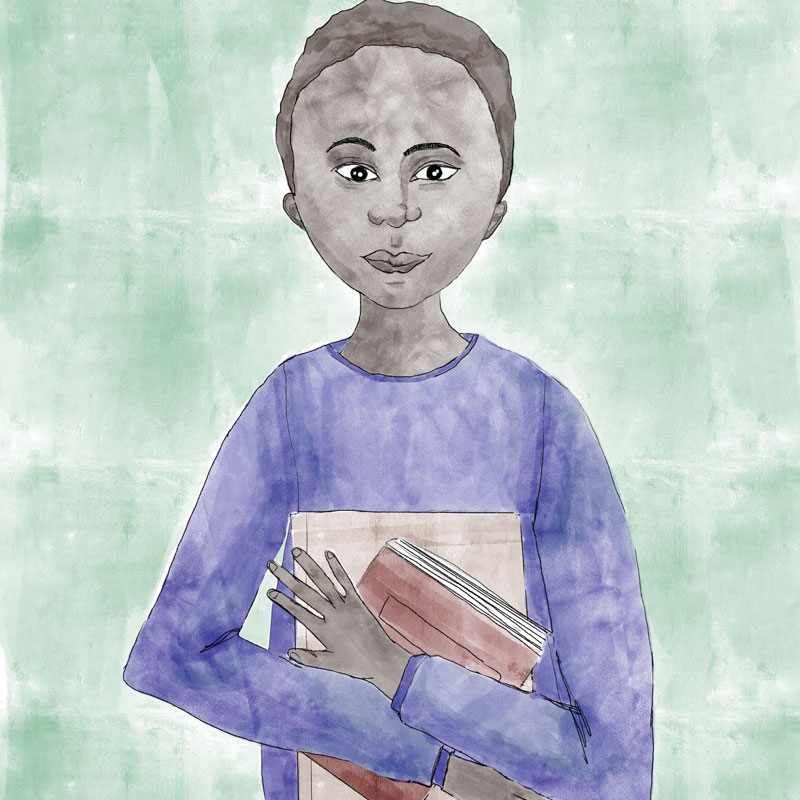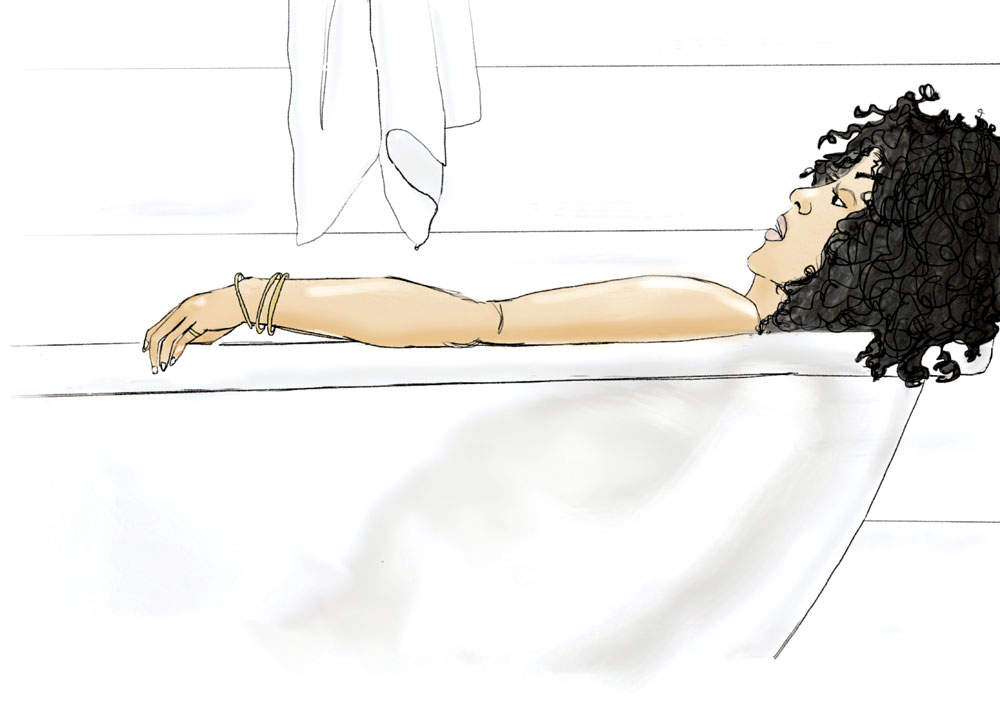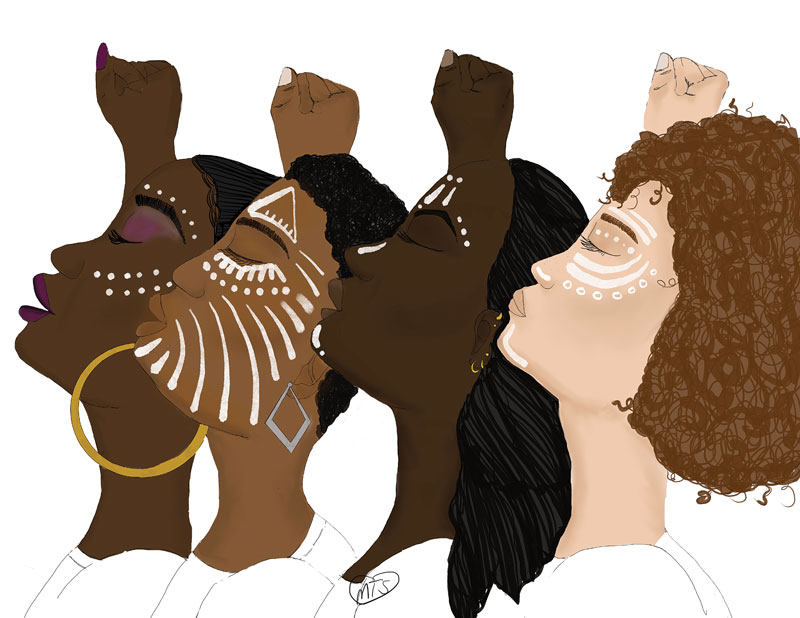
Click here to download this article as it appears in the magazine, with accompanying artwork.
This article comes from the Spring 2021 edition of the Nonprofit Quarterly, “Radical Leadership: Visioning Lines of Flight.”
So many aspects of my identity inform how I think I am being received—make me question if I belong and, ultimately, if I will be treated with dignity due to the content of my character, not solely on how I present. My imposter syndrome goes from 0 to 100 whenever I am acutely aware of what I call “The Three Ws” in my working sphere: Whiteness, Wokeness, and Wiseness.
WHITENESS
From my educational upbringing to the community I come from and a good majority of my career, navigating predominantly white spaces is not unfamiliar to me. Still, after almost three decades of wayfinding through whiteness, I too often feel the effects of imposter syndrome creep up on me.
Because imposter syndrome is fundamentally about not realizing the gravitas of one’s own brilliance and the desire to be recognized for one’s own unique contributions, I understand with every day that passes why spaces designed to center the experiences of white folks have often left me calling into question my own intellectual capacity. On a macro level, the colonial project of the United States remains invested in an undercurrent of forced mass assimilation into Anglo-Saxon Protestant tradition. We see this in what is and isn’t recognized as patriotism,1 we uplift it through many of our national holidays,2 we prop it up it with the abstruse messages encoded in the advertisements we consume daily.3
Understand white American culture, or be “uncultured.” You decide.
I think back to my teenage years, when I recall at least two white teachers who looked at me in bewilderment as I told them how moved I was while reading Soledad Brother, by George Jackson.4 He was no Mark Twain in their eyes—they could hardly understand. And because they didn’t understand, they met me with silence, a silence that was so spurning from educators from whom I desperately sought approval. (It should be noted that I had no problems diving deeply into Socrates or studying the works of Ernest Hemingway, and such endeavors were always met with praise.)
A defining behavior of those experiencing the “imposter phenomenon,” according to Pauline Clance and Suzanne Imes in their 1978 journal article “The imposter phenomenon in high achieving women,” is that individuals will choose not to reveal what they truly feel, downplaying their own interests to appease others.5 I think back on those moments and wish I would’ve told those teachers, “Socrates was no Soledad Brother.”
In my early career, I remember all too well how code switching helped me be taken seriously. Colloquial language was met with stares that reeked of judgment. More bluntly, the pride I took in my vernacular could open me up to ridicule. Let me be clear, mastery of the English language is not monopolized by white folks. I despised hearing things like, “Why are you talking white?” when growing up. But there’s danger in professional environments where the lexicon of communities of color is thought of as anything other than ordinary. It forces those of us who communicate with language that reminds us of where we come from to ask, “Am I being a fraud when I want to say something that feels right and natural, and I don’t, for the comfort of this particular audience?”
Ultimately, I find myself able to escape the vertigo of self-doubt and phoniness when I turn to the mirror and, as Tupac Shakur describes in an interview in 1997, “look directly into my face and find my soul.”6 Why do I need their stamp of approval for my intellectual range? Why am I more focused on how they see me than how I see myself? What would my Bigmama say if she saw me shape-shifting to earn the favor of white folks?
There are still times when I’ll walk (or lately, Zoom) into a mostly white board meeting, or take on work to support an all-white leadership team, and the letters galore behind their names (MPA, MPH, JD, MBA, LMAOWTF), and the stories of vacation homes, will make me feel as if I’m confined to a small sliver of the world; and the apparently funny jokes about Arrested Development will have me doing all the Google searches I can in sixty seconds.
But then I remember: I’ve been invited into their space for my lived and learned experience. They asked me to join them to give voice to what I see from my vantage point. There’s nothing phony about their need to understand my experiences and the experiences of people like me. I have nothing to prove other than my desire to build bridges in a world that seems hell-bent on knocking them down.
WOKENESS
I would’ve thought that, by 2021, this word was mostly used in jest—but apparently it still has some traction. The concept of being “woke” is one that we saw rise to prominence around 2015 to describe increased consciousness of systemic and structural oppression. It is a word that once upon a time carried real weight; it has now been weaponized by conservatives across America (woke supremacy, what???).7
Sign up for our free newsletters
Subscribe to NPQ's newsletters to have our top stories delivered directly to your inbox.
By signing up, you agree to our privacy policy and terms of use, and to receive messages from NPQ and our partners.
While the word “woke” may be mostly a joke in the spaces I navigate, what seldom feels like a joke is folks who seem persistently to derive pleasure from assessing someone else’s consciousness. These folks will test your wokeness without revealing their hand. I call this process a “woke assessment.” Woke assessments are often done to determine if you’re enlightened enough to work with, share space with, support the cause(s) of, and/or simply grace the Twitter timeline of said assessor. While we should be seeking to build with those with whom we are aligned, I often wonder if the assessment process plays out to identify how folks can grow, or to belittle them for how little they know. In my experience, these woke assessment “tools” become more popular the more privileged the environments you find yourself in: academia, philanthropic boardrooms, cocktail parties, and so on.
Also in my experience, these woke assessments are seldom extended with compassion. No, they are executed swiftly and abruptly. While I understand the urgency to build critical consciousness around all forms of oppression, I can’t help but notice the ivory-tower nature of performative wokeness. Some of my homies call this that “blue-check Twitter sh*t.” There is a wide chasm between requiring that people recognize the entirety of what makes us human and demonizing individuals for not fully regurgitating the buzzwords of your choosing.
And still, as this feeling becomes more and more common for me, I’ve noticed myself creeping into the self-doubting space of asking: Am I aware enough? Do they understand just how much I care? If I stumble into a reckless “no” to any of those questions, it’s a recipe for self-imposed catastrophic guilt.
I can overcalibrate for displays of enlightenment, exerting immense amounts of effort to prove I am knowledgeable about any issue at hand, but not truly figuring out my unique call to action. Ultimately, that becomes an exercise in disingenuity. Clance and Imes identify another behavior that those with imposter syndrome experience: seeking the approval of “superiors.” The superiors are those who, while assessing your wokeness, feel entitled to deliver the ultimate pollice verso,8 determining your fate vis-à-vis whether or not you’re conscious enough to carry on in shared space.
I imagine that even after years of working to support leaders across fields, lending my time and voice to various movements, there will always be a chance to be more conscious or “woke.” I believe it was Socrates who said, “I know that I know nothing.” Every act of introspection inspired by assessing my own “wokeness” returns me to this truth. If I hold that truth closely, I don’t have to worry too much about others’ assessments of me—because there is no assessment that can be given that magically completes the quest to recognize people’s humanity. That is a lifelong process, and only satisfied when one forms meaningful connections with others because of who they are, not just what they know.
WISENESS
I grew up in the age of Nintendo 64 and PlayStation. Yes, I am dating myself: I’m a millennial, and I wear it as a badge of honor. I often find myself to be the youngest person in the room. Perhaps many of my millennial peers can recall a time, as do I, when someone told them, “You’re wise beyond your years” as a form of flattery. (I can only imagine how Gen-Z folks feel hearing the phrase.) The compliment always comes from those I can confirm, or that I perceive, to be my elders. Having been raised by my Grandmother, I do appreciate the compliment, because it makes me think of the wisdom she exuded so effortlessly. But it often makes me wonder: what compels people to appraise someone else’s wisdom?
Wisdom is understood in so many ways: self-transcendence; the ability to exercise good judgment; having an abundance of experiences from which to draw. For the sake of keeping the “-ness” in my three Ws, I will offer that wiseness is the measure of being wise or exercising wisdom. I work in a space of supporting leaders and creating spaces for learning. For the leaders I support, exercising good judgment is highly important in having their leadership recognized. Transcending limitations is inspiring. Sharing a wealth of experiences allows individuals to connect with folks across many walks of life. All of this can be true, but the goalposts shift when wisdom is made inextricable from age—when the driving factor of our wiseness is the decade we were born. Wisdom and age are not a 1:1 tandem.
I’ve seen so many brilliant leaders who are afraid to take on increased risk and responsibility because they have been told, “You don’t have enough experience.” You’ll have twenty-something-year-olds working in agencies to end homelessness, who have formerly been without a home—for years of their lives—told, “You don’t have enough experience” to lead in significant ways. The irony.
When we ask ourselves about the measure of our wisdom, we should never be content with landing on our date of birth. For me, when doubt of my wiseness creeps in due to being the youngest person in the room, I recall the grief that I’ve endured, the tragedies I’ve turned into triumph, the seemingly endless moments of laughter I’ve shared with folks from across the world.
Doubt projected onto me by others and doubt I’ve internalized have stifled my development. Introspection is one antidote to the incendiary doubts we experience when imposter syndrome takes root. Introspection is the gateway to self-determination within our psyches. Ultimately, understanding why we experience the doubts we do and where they are coming from presents us with the choice to question what it is we need to overcome them. Not what someone else says we need. Not what we’ve been told we’re supposed to need. But what we know at our core, looking in that mirror, we truly need.
…
Whether the source is from reactions to Whiteness, Wokeness, or Wiseness, the doubts I unpack only make me more capable of asking myself the questions I must to catapult me to places of pride, fulfillment, and purpose. Imposter syndrome may not be going anywhere for many of us, but introspection will allow us to show up authentically.
Notes
- Eli Watkins, “Pence leaves Colts game after protest during anthem,” CNN Politics, October 9, 2017.
- Christian Allaire, “Why I’m Not Celebrating Thanksgiving This Year,” Vogue, November 25, 2020.
- Trevor Robinson, “A Brief Rundown of Racism Within Advertising and Why It’s Still Happening Today,” Adweek, February 21, 2019.
- George Jackson, Soledad Brother: The Prison Letters of George Jackson (New York: Coward-McCann, 1970).
- Pauline R. Clance and Suzanne A. Imes, “The imposter phenomenon in high achieving women: Dynamics and therapeutic intervention,” Psychotherapy: Theory, Research and Practice 15, no. 3 (Fall 1978): 241–47.
- MTV News Staff, “Tupac Talks about Acting Goals in One of His Last Interviews,” MTV News, September 26, 1997.
- “Lemon to Sen. Tim Scott: I don’t want to yell, but what are you doing?,” CNN Politics (video), CNN Tonight, March 11, 2021.
- “Commodus Gives a Thumbs Down,” from Gladiator, directed by Ridley Scott (2000, DreamWorks and Universal).
Kad Smith is the founder of Twelve26 Solutions, LLC. Smith is also a member of CompassPoint’s teacher team, a lead designer and cofacilitator of CompassPoint’s B.L.A.C.K Team Intensive, and he trains frequently in the organization’s public workshops. In his former role as a project director at CompassPoint, Smith specialized in program design and facilitation of the organization’s cohort leadership programs. He currently serves on the board of directors for Berkeley’s Ecology Center and GreenPeace Fund USA.











